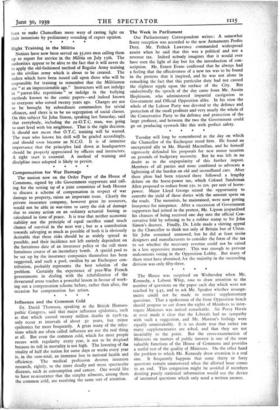Tuesday will long be remembered as the day on which
the Chancellor of the Exchequer stood firm. He found an unexpected ally in Mr. Harold Macmillan, and he himself vigorously defended his proposals for new motor taxation on grounds of budgetary necessity. But he was left in no doubt as to the unpopularity of this further impost. Members of all parties and none combined to advocate a lightening of the burden on old and secondhand cars. After these pleas had been rejected there followed a lengthy debate on the horse-power tax, which Colonel Sandman Allen proposed to reduce from 25s. to 20S. per unit of horse- power. Major Lloyd George seized the opportunity to contrast the yield of these duties with the amount spent on the roads. The motorists, he maintained, were now getting fourpence for ninepence. After a succession of Government supporters had joined in the protest, Mr. Lipson jeopardised his chances of being received one day into the official Con- servative fold by refusing to be a rubber stamp to Sir John Simon's decrees. Finally, Dr. Little made a stirring appeal to the Chancellor to think not only of Britain but of Ulster. Sir John remained unmoved, but he did at least invite designers and manufacturers to consider the form of the tax to see whether the necessary revenue could not be raised in a less oppressive manner. This was enough to prevent malcontents voting in the Opposition Lobby. But many of them must have abstained, for the majority in the succeeding division was only fifty-three.










































 Previous page
Previous page